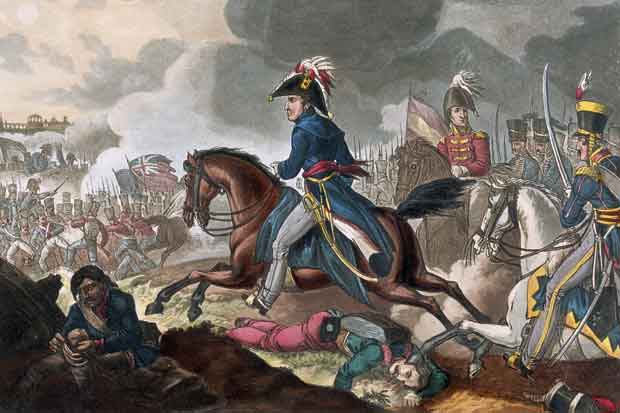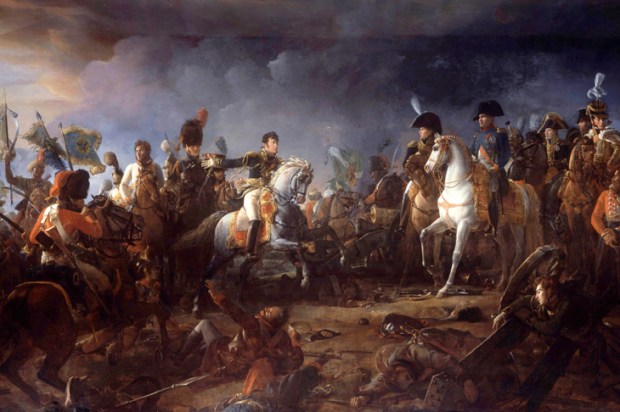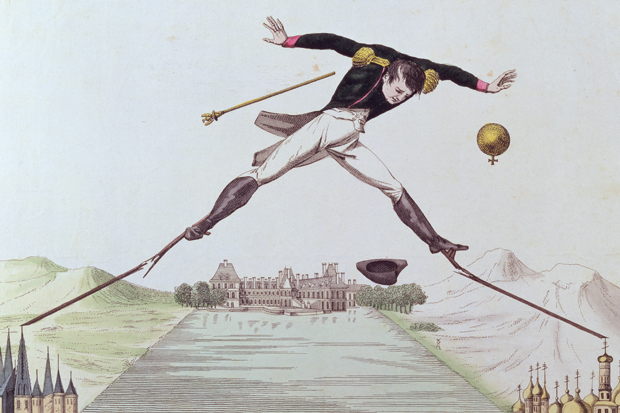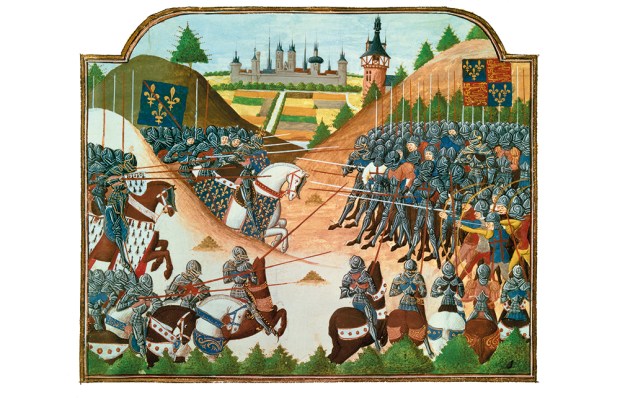It feels the height of ingratitude to blame Jane Austen for anything, but it probably is her fault that most people seem to think that the only impact that the Napoleonic War had on British life was to bring Mr Wickham and the militia into the lives of the Bennet girls. It is certainly true that the outcome of Persuasion revolves around the huge amount of prize money that a frigate captain could make out of the war, but with the exception of a few teasing remarks from Henry Tilney at Catherine Morland’s expense in Northanger Abbey you could read all Jane Austen’s works and still not know that she had spent virtually the whole of her adult life in a country locked in a war that was ‘total’ in the same sense that the two world wars of the 20th century were total wars.
It did not matter whether you were rich and subject to new taxes or poor and subject to the press gangs, whether you were waist-deep in the cold waters off the Hebrides farming kelp or shopping for ribbons in Meryton, whether you had been driven off the land to make way for sheep or bankrupted by a government contract, war and the economic consequences of war touched every life. ‘The whole air was filled with war,’ James Nasmyth, the great Victorian engineer, would recall of his childhood in Edinburgh more than 60 years later:
Troops and bands paraded the streets. Recruits were sent away as fast as they could be drilled. Everybody was full of excitement. When the great guns boomed forth from the castle, the people were first startled. Then they were surprised and anxious. There had been battle and victory! Who had fallen? was the first thought in many minds. Where had the battle been, and what was the victory? Business was suspended. People rushed around the streets to ascertain the facts. It might have been at Salamanca, Talavera or Vittoria. But a long time elapsed before the details could be received; and during that time sad suspense and anxiety prevailed in almost every household.
In their very different ways these two superb books address the ways in which Britain first survived and then defeated the menace of Revolutionary and Napoleonic France. Roger Knight begins the story with the Younger Pitt and the reforms of the 1780s, and then in a series of richly detailed chapters looks at the manner in which Britain reinvented itself to face the challenge, breaking through the old carapace of entrenched interests, privilege, institutional corruption and systemic incompetence to harness the public and private sectors into an administrative machine capable of sustaining a conflict that would last four times as long as either world war.
This is a book about the Victualling Department and the Navy Board, about the Admiralty and Horse Guards, about government contracts and procurement, about the mechanics of trade and finance, about foundries and dockyards and manpower, and for anyone used to thinking of the period in any more glamorous terms, it will be a wonderfully disorienting read. Knight is just about prepared to give the great names in the drama their small walk-on parts, but for him the real heroes of the struggle against Napoleon are not Wellington or Nelson or Collingwood or Cochrane but the clerks and administrators and ‘silent men of business’ who put Britain’s armies in the field and kept her ships at sea and her allies in funds and ultimately won the war.
It is a rare gift to make the intrinsically dull interesting, to tell you things that you thought that you didn’t want to know in a compelling manner — imagine a biography of Charles Lamb, say, that dealt exclusively with his nine-to-five at the East India Office and you have the literary equivalent — and Knight has that gift in spades. The structure of the book very occasionally creaks under a lifetime’s weight of information, but there is scarcely a wasted sentence here, not a duff page, not a chapter, however unpromising the title — ‘Whitehall at War’, ‘Feeding the Armed Forces’, ‘Transporting the Army by Sea’, ‘Blockade, Taxes, and the City of London’ — that does not bring you very close to the realities of a total war and the justice of Knight’s claims for a succession of Tory governments prepared to muscle it out.
It goes against the grain to forgive Pitt the repressive measures of the 1790s, or to think anything good of the wretched Liverpool government or men like John Wilson Croker; but if you accept Knight’s premise that the only thing that mattered was the defeat of Napoleon, then there is no denying their achievements.
At the outbreak of war Pitt had neither the army nor the administrative personnel to take advantage of a temporary superiority over Revolutionary France, but as the conflict went on, the old guard was replaced by young blood and a politics of sinecures and self-interest gave way to a culture of disinterested public service, hard work, accountability and growing transparency that was arguably the Younger Pitt’s greatest legacy to the country.
Knight is good on the army, good on the ‘home front’, good with his character sketches and vignettes, but he is first and foremost a naval historian, though it is not just a natural bias that puts the navy and its organisation at the heart of Britain against Napoleon. For the great part of the war — possibly for far longer than was actually necessary — the fear of invasion was a constant of government thinking. Even when that had passed, the demands of economic warfare, convoy work and years of blockade duty — the endless search for new sources of hemp or wood, for instance, for more reliable cannon, for technological answers to rusting bolts, for skilled manpower, for dockyard resources — made the navy simultaneously the greatest stimulant and consumer of the country’s innovative energies and resources.
It is a truth universally acknowledged, however, that a maritime power in possession of a navy is never going to defeat a continental power in control of Europe, so it is perhaps right that the last word here should rest with Wellington and the army. For the first 15 years of the war against France the only thing that stood between Britain and disaster were her fleets; but from the ugly fall-out of the Basque Roads in 1809 onwards the prestige of the navy declined at the same time that Wellington’s Peninsular victories were not only draining French manpower at a crucial stage of the war but eroding that historical British distrust of a standing army.
It is too much to expect that with the bicentenary of Waterloo only 18 months away this will be the last book on Wellington, but I doubt that there will be a better. It will be a hard wrench for many to desert Elizabeth Longford, but the difference between her memorable biography and Rory Muir’s Wellington is that between a romantic flirtation and a sustained piece of man-to-man marking that has meant that for the last 30 years Wellington and the British army has never been out of Muir’s sights.
It is not long on charm, and fairly perfunctory on the personal side of things, but there seems nothing that Muir does not know about Wellington and no phase of the career from Dublin Castle to Maratha politics where he is not at home. It is one of the oddities of Wellington’s life that he was initially such a reluctant and disappointed soldier, but in a sense that only plays into Muir’s hands in providing him with the cue for a biography that is as determined to free him from the straightjacket of battles and military tactics as it is from the sentimentalising trivia of his late ‘anecdotage’.
The battles inevitably take centre stage here, and are described with an assured and commanding clarity — the early humiliations in the Low Countries, the bruising reversal in the Sultanpettah Tope before Seringapatam, the first major victory of Assaye, the sieges of Ciudad Rodrigo and Badajos — but he never loses sight of the wider context of Wellington’s career.
The full rewards for Muir’s resolve will have to await a second volume (and what an infuriating place to end this one — 1814!), but as he is at pains to point out here, Arthur Wellesley ‘was a member of parliament before he saw a shot fired in anger’, and ‘politics and the army’ — from Ireland to the rumpus over Cintra and the abiding suspicion of the Opposition — ‘were intimately entwined throughout his career, from the very beginning until the end’.
There would never be a time, from Wellington’s first days in India (where his brother was governor-general) to the final advance into France, when he would not feel the ambiguous blessings of his Wellesley connections, and even after Waterloo an unreconstructed old Whig like Samuel Parr could never forgive him his politics.
It will be fascinating to see what Muir eventually makes of Wellington’s peacetime role in Paris and Vienna on either side of Bonaparte’s desperate Hundred Days, but what this first volume triumphantly shows is that in Arthur Wellesley and his endless capacity for taking pains, his ability to learn from mistakes, his meticulous attention to detail, his grasp of the vital importance of logistics, his resolve and clarity of thinking, the ‘war machine’ that Roger Knight describes with such compelling detail had found its perfect executive instrument.
Knight may well be right that the Peninsular War could no more have been won without the City than Trafalgar without the dockyards, but neither could it have been fought without Wellington. ‘By God, I don’t think anyone else could have done it,’ Wellington himself would remark in a rare moment of afflatus after Waterloo, and Rory Muir’s biography leaves little room for doubt that the same applied to his whole career, back to the bloody victory at Assaye.
These two books complement each other perfectly. For anyone interested in the Napoleonic period, this is a very good time to be a reader.
Got something to add? Join the discussion and comment below.
Get 10 issues for just $10
Subscribe to The Spectator Australia today for the next 10 magazine issues, plus full online access, for just $10.
Britain Against Napoleon: The Organisation of Victory, 1793-1815 is available from the Spectator Bookshop, £23.95, Tel: 08430 600033.
Wellington: The Path to Victory, 1769-1814 is available from the Spectator Bookshop, £23.95, Tel: 08430 600033.
You might disagree with half of it, but you’ll enjoy reading all of it. Try your first month for free, then just $2 a week for the remainder of your first year.














Comments
Don't miss out
Join the conversation with other Spectator Australia readers. Subscribe to leave a comment.
SUBSCRIBEAlready a subscriber? Log in